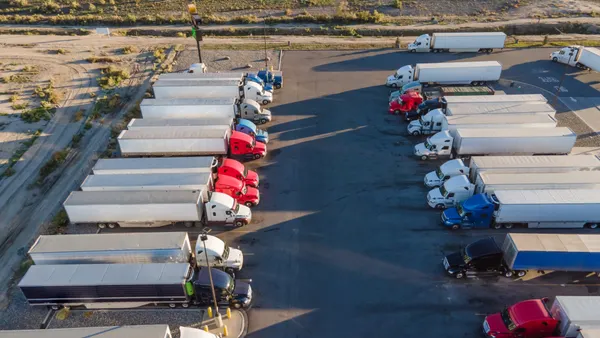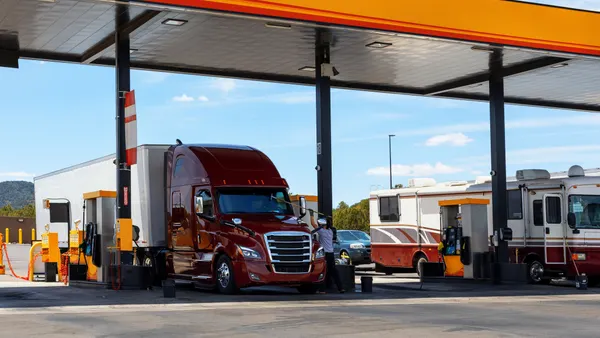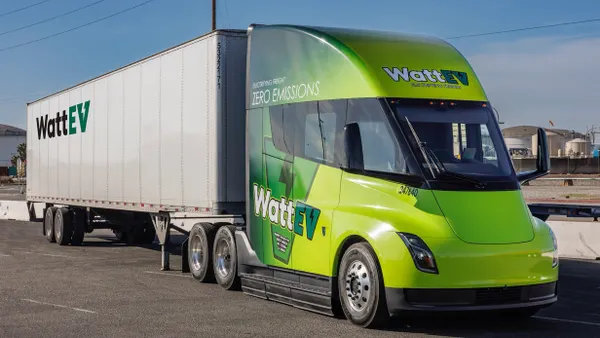Some carriers were caught offguard by the pandemic, an economic shock much like the oil embargoes of the 1970s, the attacks of 9/11, or the Great Recession of 2007-2009.
But the best carriers saw what happened during the last recession and learned from it. They put practices into place that would serve as shock absorbers if such economic damage happened again. One of those carriers is Old Dominion Freight Line, Transport Dive's company of the year. The trick to it all is consistency, the Old Dominion chief said, a lesson that was in place 10 years ago.
"We have been extremely consistent even going back to the recession of 2009. We did not cut service."

Greg Gantt
CEO, Old Dominion
"We have been extremely consistent even going back to the recession of 2009," said Greg Gantt, Old Dominion CEO. "We did not cut service."
The temptations were there, though. Early in the onset of the COVID-19 pandemic, some LTL competitors cut prices, and customers took note.
"We did lose some business early on because of price," said Gantt. "All of a sudden, everyone had extra capacity."
But the customers noticed something non-price factors were missing, Gantt said — factors such as on-time delivery, quality of customer service, care of shipment. Old Dominion says its on-time LTL service is 99%, and has been for several years. It's an industry-leading statistic, the company says, and led Old Dominion to be the overall winner of the Mastio Quality Award for LTL firms, the 11th year in a row the company has won the title. It was a service commitment the firm did not ease up on during the pandemic, and Gantt said clients noticed.
"They didn't get the service," said Gantt. "Some came back in weeks, some came back in months."
An ethos built around service
Benjamin Hartford, an analyst for R.W. Baird and Co. who follows Old Dominion, said the fleet has focused on service quality, consistency and fair pricing for about 15 years.
"That kind of ethos has allowed it to differentiate itself," said Hartford.
The main lesson learned could be that it is hard to cut price and maintain quality, Hartford said. And shippers care about on-time delivery and intactness of freight as much as price. Old Dominion excels at on-time delivery and freight care, said Hartford. The focus came as the LTL industry changed over the last 15 years, Hartford said, going from an emphasis on speed to having a greater concern about costs and quality.
Gantt said shippers care about moving freight through the system without claims. Freight is "blocked and braced," said Gantt, a process of freight care that is not cheap.
"Look around you. We probably hauled it."

Greg Gantt
CEO, Old Dominion
Its shippers are diverse, Gantt said. Their freight includes tires, medical items, retail and food.
"Look around you," said Gantt. "We probably hauled it."
Old Dominion is also eager to sell its services to more shippers. It seeks a bigger LTL market share, Gantt said.
The LTL marketplace is highly competitive, with top names in the field. At the end of 2019, FedEx Freight led with about 16.8% of the LTL market, according to research shared by Baird. YRC Worldwide comes in at second, at 11%, with Old Dominion placing third with 9.3%. XPO and UPS rank fourth and fifth, respectively.
To gain more share, Old Dominion is selling its services via TV.
"We started ads a few years ago," said Gantt. "We felt it extremely important to build our brand."
The one barrier to higher share is capacity, Gantt said, but not the kind related to equipment. LTL companies need more service centers to add capacity, while typically TL companies do not have the same need. More service centers require local zoning approvals, which is time-consuming to acquire.
In the past, Old Dominion has been able to pick up leftover real estate that other carriers sold. But that strategy is fading, as there are only so many such buildings left.
"As time goes on, all of a sudden they're gone," said Gantt.
The company is currently working on 15 new centers. Gantt said he would like to produce 20 more, on top of the 15.
Drivers home in time
Being an LTL fleet also means drivers tend to be home at the end of the work day. Gantt said 90% of drivers are home after a run.
Turnover for the fleet is under 10%, and that includes retirements, Gantt said. That is far less than big truckload firms, which had 88% turnover in the first half of 2020, according to the American Trucking Associations. For large LTLs in the same time period, the turnover was 12%.
The coronavirus presented immediate challenges to Old Dominion's operations in the spring.
Gantt said the company scrambled to space out the workforce at terminals, and let as many employees work from home as it could. The company followed guidance from the U.S. Centers for Disease Control and Prevention and the World Health Organization. It instructed employees to clean and disinfect spaces regularly.
"We did an awful lot in a short amount of time," said Gantt.
Update: This story was updated to reflect Old Dominion won the Mastio Quality Award for LTL firms for an 11th consecutive year.



 Read more
Read more








